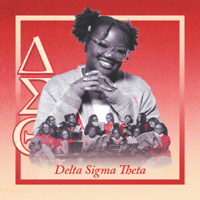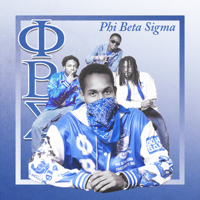
Nick Utsey’s life changed November 2022 as he stood among members of the National Pan-Hellenic Council in Rosebud Theatre.
Utsey felt his nerves building. He was minutes away from officially becoming a member of Alpha Phi Alpha, the same fraternity his father joined years ago.
Utsey was never forced to follow the same path, he said. But he had seen how his father conducted himself with friends and family, noticing how the organization’s benefits seeped into the corners of his family’s life.
Upon lifting his ceremonial mask, there stood his father. It was official. Utsey is an Alpha Phi Alpha member.
“For the rest of my life, I would be able to call my dad ‘my brother,’” Utsey, NPHC president, chapter vice president and journalism senior, recalled seeing his father in Alpha Phi Alpha letters.
Founded in 1906, Alpha Phi Alpha was the first intercollegiate Greek-lettered fraternity established for Black men, laying the groundwork for the Divine Nine.
The National Pan-Hellenic Council is the governing body of the nine historically Black Greek-letter organizations, affectionately known as the Divine Nine. With the return of Kappa Alpha Psi and Iota Phi Theta, UTA is the only UT System campus, and one of the only Texas colleges, to have a complete Divine Nine.

The safe space
NPHC organizations were built in response to the exclusion of Black students from not only predominantly white colleges and universities but also fraternities and sororities at that time, said Amanda Perez, Fraternity and Sorority Life director.
UTA is not a Historically Black College or University, so to have all Divine Nine organizations is a feat in itself, Perez said. They allow more students of color to find a sense of belonging through their differences and what they bring to the table.
The first fraternity in the U.S. was founded in the early 1770s and was predominantly open to white men. This led to the first Greek-letter women’s fraternity founded in 1870. Later, organizations adopted the terms sorority, “soror” meaning sister in Latin, and fraternity, “frater” meaning brother.
When Black students got to the point where they could attend college, they weren’t permitted to join study groups or other literary societies, said Tamara Brown, provost and senior vice president of Academic Affairs.
“You can be on the campus, but you really can’t engage with people,” Brown, a Delta Sigma Theta, said.

The introduction of Black organizations began with academics, which continue to be a focal point in all NPHC organizations today, creating their own groups to accomplish the same kind of educational and academic benefits.
A movement followed, but why do we still need them?
“They are still advocating for the inclusion of disenfranchised groups. I think if we didn’t have the societal challenges that we have, it’d be easier to answer that sort of question,” Brown said. “We still don’t have the level playing field. We still don’t have civil rights assurances. I mean, go down the list, right?”
A lot has changed since 1906, but Utsey said Alpha Phi Alpha’s mission remains the same: “Having a seat at the table. Representing yourself. Representing your community.”
From activists like Martin Luther King Jr., Rosa Parks and Jesse Jackson to former Vice President Kamala Harris, Utsey said NPHC organizations have to remember the unsung heroes who made lasting changes.
“D-Nine history is Black history,” he said.

The identities
Alpha Phi Alpha prides itself on becoming a man of distinction. Delta Sigma Theta is civically engaged. Kappa Alpha Psi members are leaders. Alpha Kappa Alpha values creating a space for Black women.
Each organization has its own culture, personality and history. But every group is rooted in service to the greater community.
“Whether it be through servant mentorship, whether it be through political advocacy and social action, sexual education,” Utsey said. “All nine organizations pick issues that they’re passionate about.”

Starting college in 2021, Utsey joined organizations in hopes of advancing his career. After seeing Alpha Phi Alpha’s impact across campus, he said his involvement was no longer just about him — but the community.
In 1987, Brown became a member of the Pi Mu Chapter of Delta Sigma Theta’s chartering line at Longwood University in Farmville, Virginia.
Brown had long been impressed with the organization’s civic engagement, so even though Longwood University offered other NPHCs at the time, she was determined to align with Delta Sigma Theta’s history.
“I read about the March on Washington for women’s rights, and Deltas were the only organization participating in that and got themselves there and marched as a part of rights for all women,” she said.

The give back
The return of organizations to UTA also means the return of its alumni.
“The success of a chapter can really rely on ‘What is their chapter support from the alumni perspective?’” Perez said. “Whenever you have people who went to UTA, they understand the culture. They have a love not just for their chapter but the university. That can only encourage a chapter to be as successful as possible.”
Alumnus Kevin Allen mostly kept to himself when he first transferred to UTA. His family members were a part of Greek life organizations, but it wasn’t until he saw an NPHC showcase flyer that he learned of their presence on campus.
With a cousin who was a Kappa Alpha Psi member, Allen was set on his choice to join.

Allen, the Kappa Alpha Psi alumni chapter adviser, knows what it takes to mentor and guide students, he said.
“When you come through the door, you help maintain that the door is open for someone behind you,” he said. “Part of that responsibility is mentoring, staying active, supporting the alumni chapter, which in turn supports the undergraduate chapter.”
Brown recalls her time as a student when a staff member, also a Delta Sigma Theta alumna, took it upon herself to guide the newly created chapter.
Now on the other side of the organization, she makes it a point to be accessible to UTA’s Delta Sigma Theta chapter. Since Brown joined UTA in 2022, the chapter has reached out to meet each semester.
Alumna Keri DeCay became an Alpha Kappa Alpha in 2016, her last year at UTA. As the organization’s first president after a six-year suspension, DeCay didn’t have anybody from the chapter to guide her. But she gave it her all.

“A lot of my line sisters that are now alum, they laugh because we come back for homecoming and different things and events and they’re like, ‘Wow, we started this. We created this,’” DeCay said. “They’re still doing strolls that we did and we created because we were creating everything from scratch.”
As the Follett Student Leadership Center assistant director, DeCay continues that lifelong commitment by giving back to not only her sorority but to every NPHC student at UTA.
“I didn’t have a lot of that, but the staff members were so helpful to me,” she said. “I want to be able to do that for other students since it was done for me.”
DeCay is one of the many NPHC members who came back to serve UTA students including members from UTA Admissions, UTA Athletics, Student Affairs and the Center for African American Studies.
While every leader may not have been initiated at UTA, they are bonded by their idea of providing to the next generation, Utsey said just as many founders envisioned over a century ago.

Black students don’t always see people who look like them in certain areas like leadership roles, Utsey said. Yet, in the past five years, Alpha Phi Alpha brothers have served as Mr. UTA, homecoming king and Student Government leaders.
“Not only as a student. Not only as a Black student. Not only as a Black student leader, but a Black student leader in the Divine Nine,” Utsey said. “It adds an extra layer of intimacy and understanding between us and administration.”
Every chapter at each college and university has a unique experience, DeCay said. However, she knows she has a sister anywhere in the world. Over a million people belong to Divine Nine organizations.
The Divine Nine had not been completed since DeCay was on campus and she said she is excited for students to see how great having all the organizations can be.

Though UTA’s Kappa Alpha Psi chapter was chartered nearly 50 years ago, it has yet to have a true legacy — a father and son who cross the same NPHC organization at the same university.
Allen said he hopes to provide that opportunity one day, but that can only happen if Kappa Alpha Psi is still available to the next generation.
“This is my school. This is my chapter, and so I feel a really big obligation to make sure that Kappa is available to someone like me 20 years from now,” he said.
@trinhvchristine






















